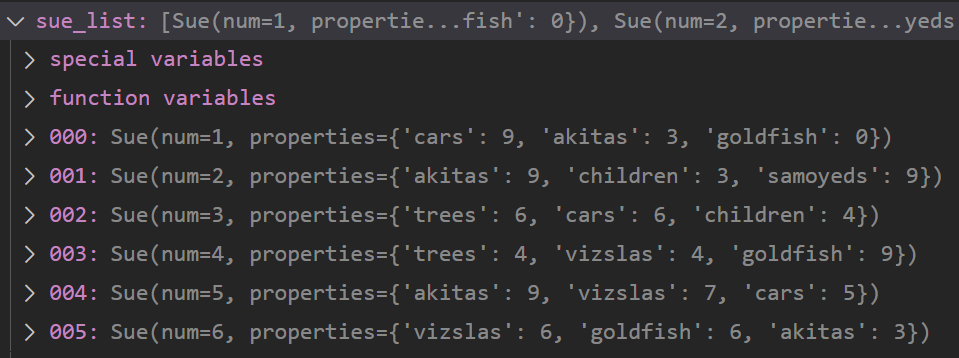Learning Python with Advent of Code Walkthroughs
Dazbo's Advent of Code solutions, written in Python

Advent of Code 2015 - Day 16
Useful Links
Concepts and Packages Demonstrated
Page Navigation
Problem Intro
Apparently, we have received a present from one of our 500 aunts named “Sue”. We need to find out which one to thank.
The present she sent us as a MFCSAM: My First Crime Scene Analysis Machine. We use it to detect a bunch of attributes abotut the Sue we need to write to:
children: 3
cats: 7
samoyeds: 2
pomeranians: 3
akitas: 0
vizslas: 0
goldfish: 5
trees: 3
cars: 2
perfumes: 1
You’ve created a list of attributes that you can remember about each Sue. If properties are missing from any given Sue, it means we simply can’t remember that detail. The data looks something like this…
Sue 1: cars: 9, akitas: 3, goldfish: 0
Sue 2: akitas: 9, children: 3, samoyeds: 9
Sue 3: trees: 6, cars: 6, children: 4
Sue 4: trees: 4, vizslas: 4, goldfish: 9
Sue 5: akitas: 9, vizslas: 7, cars: 5
Sue 6: vizslas: 6, goldfish: 6, akitas: 3
...
So, we know Sue 1 has 9 cars, 3 akitas, and 0 goldfish. She might also have any number of trees; we just don't remember.
Part 1
What is the number of the Sue that got you the gift?
Here’s my strategy:
- Iterate through each key:value pair from the known attributes from the MFCSAM.
- For each:
- If the key is present, and the value matches what the MFCSAM told us, then this Sue is a candidate.
- If the key is not present, then this Sue could also be a candidate.
- For each:
And I hope that by the time I’ve processed the full list of MFCSAM attributes, there will only be one Sue left.
First, let’s create a dictionary to contain all the attributes that we know about, from the MFCSAM:
known_attribs = {
'children': 3,
'cats': 7,
'samoyeds': 2,
'pomeranians': 3,
'akitas': 0,
'vizslas': 0,
'goldfish': 5,
'trees': 3,
'cars': 2,
'perfumes': 1
}
Next, let’s create a dataclass so that we store all our instances of Sue:
@dataclass
class Sue:
""" A Sue has a unique number and a set of properties that look like...
{'pomeranians': 3, 'perfumes': 1, 'vizslas': 0}
"""
num: int
properties: dict
Now we can process the input data:
def process_input(data) -> list[Sue]:
# Input looks like:
# Sue 1: cars: 9, akitas: 3, goldfish: 0
# Return list of Sue objects.
sue_list = []
for line in data:
sue_num, attribs = line[4:].split(":", 1)
properties = [x.strip().split(":") for x in attribs.split(",")]
props_dict = {prop[0]: int(prop[1]) for prop in properties}
sue_list.append(Sue(int(sue_num), props_dict))
return sue_list
How does this work?
- We create an empty
listto store all ourSueobjects. - We process each “Sue” line. Imagine we have this line:
Sue 1: cars: 9, akitas: 3, goldfish: 0 - We split the line at the first
:, but ignoring the first four characters, i.e. ignoringSue. This returns two values:- The number of the Sue.
- All the attributes, in a format that looks like this:
` cars: 9, akitas: 3, goldfish: 0`
- We then have a list comprehension whcih splits this line at the commas, and for each
property: countreturned, further splits at the:. So, with our example, we end up with this list:
[['cars', ' 9'], ['akitas', ' 3'], ['goldfish', ' 0']] - We then turn this list into a
dictionary, using a dictionary comprehension. So now we have this:
{'cars': 9, 'akitas': 3, 'goldfish': 0} - Now we can create a
Sueobject from the Sue number, and thisdictof attributes. - And add the
Sueobject to ourlist.
If I look at the resulting Sue list in my IDE debugger, it looks like this:

Now we’re ready to implement the strategy described above:
# we need to find any Sue where k:v is an exact match
# but also consider any Sue where the k is not present as we don't know the v
for known_attrib, known_attrib_value in known_attribs.items():
sues_matching_attrib = [sue for sue in sue_candidates
if known_attrib in sue.properties
and known_attrib_value == sue.properties[known_attrib]]
sues_missing_attrib = [sue for sue in sue_candidates if known_attrib not in sue.properties]
sue_candidates = sues_matching_attrib + sues_missing_attrib
print(f"Part 1: Aunt Sue candidates matching MFCSAM attributes: {sue_candidates[0].num}")
How does it work?
- We iterate through our list of known properties and values from the MFCSAM.
- We use list comprehension to return a
listof all theSueobjects, where the key and value match what the MFCSAM told us. - We use list comprehension to return a
listof all theSueobjects, where the key is not specified our theSueobjects. - We add these two lists together, to get our overall
listof remaining candidates. - With each iteration, the candidate list gets shorter and shorter.
- We use list comprehension to return a
Eventually, there’s only one left.
Part 2
We’re told that some of the readings from the MFCSAM are not accurate. Specifically:
catsandtreesvalues indicate that there are at more that many.pomeraniansandgoldfishvalues indicate that there are fewer than that many.
So we just need to modify our logic accordingly:
for known_attrib, known_attrib_value in known_attribs.items():
sues_missing_attrib = [sue for sue in sue_candidates if known_attrib not in sue.properties]
sues_matching_attrib = []
if known_attrib in ['cats', 'trees']:
sues_matching_attrib = [sue for sue in sue_candidates if known_attrib in sue.properties
and known_attrib_value < sue.properties[known_attrib]]
elif known_attrib in ['pomeranians', 'goldfish']:
sues_matching_attrib = [sue for sue in sue_candidates if known_attrib in sue.properties
and known_attrib_value > sue.properties[known_attrib]]
else:
sues_matching_attrib = [sue for sue in sue_candidates if known_attrib in sue.properties
and known_attrib_value == sue.properties[known_attrib]]
sue_candidates = sues_matching_attrib + sues_missing_attrib
print(f"Part 2: Aunt Sue candidates matching MFCSAM attributes: {sue_candidates[0].num}")
Results
Here is the final code:
from dataclasses import dataclass
import os
import time
SCRIPT_DIR = os.path.dirname(__file__)
INPUT_FILE = "input/input.txt"
known_attribs = {
'children': 3,
'cats': 7,
'samoyeds': 2,
'pomeranians': 3,
'akitas': 0,
'vizslas': 0,
'goldfish': 5,
'trees': 3,
'cars': 2,
'perfumes': 1
}
@dataclass
class Sue:
""" A Sue has a unique number and a set of properties that look like...
{'pomeranians': 3, 'perfumes': 1, 'vizslas': 0}
"""
num: int
properties: dict
def main():
input_file = os.path.join(SCRIPT_DIR, INPUT_FILE)
with open(input_file, mode="rt") as f:
data = f.read().splitlines()
sue_list = process_input(data)
# Part 1
sue_candidates = sue_list.copy()
# we need to find any Sue where k:v is an exact match
# but also consider any Sue where the k is not present as we don't know the v
for known_attrib, known_attrib_value in known_attribs.items():
sues_matching_attrib = [sue for sue in sue_candidates if known_attrib in sue.properties
and known_attrib_value == sue.properties[known_attrib]]
sues_missing_attrib = [sue for sue in sue_candidates if known_attrib not in sue.properties]
sue_candidates = sues_matching_attrib + sues_missing_attrib
print(f"Part 1: Aunt Sue candidates matching MFCSAM attributes: {sue_candidates[0].num}")
# Part 2
sue_candidates = sue_list.copy()
for known_attrib, known_attrib_value in known_attribs.items():
sues_missing_attrib = [sue for sue in sue_candidates if known_attrib not in sue.properties]
sues_matching_attrib = []
if known_attrib in ['cats', 'trees']:
sues_matching_attrib = [sue for sue in sue_candidates if known_attrib in sue.properties
and known_attrib_value < sue.properties[known_attrib]]
elif known_attrib in ['pomeranians', 'goldfish']:
sues_matching_attrib = [sue for sue in sue_candidates if known_attrib in sue.properties
and known_attrib_value > sue.properties[known_attrib]]
else:
sues_matching_attrib = [sue for sue in sue_candidates if known_attrib in sue.properties
and known_attrib_value == sue.properties[known_attrib]]
sue_candidates = sues_matching_attrib + sues_missing_attrib
print(f"Part 2: Aunt Sue candidates matching MFCSAM attributes: {sue_candidates[0].num}")
def process_input(data) -> list[Sue]:
# Input looks like:
# Sue 1: cars: 9, akitas: 3, goldfish: 0
# Return list of Sue objects.
sue_list = []
for line in data:
sue_num, attribs = line[4:].split(":", 1)
properties = [x.strip().split(":") for x in attribs.split(",")]
props_dict = {prop[0]: int(prop[1]) for prop in properties}
sue_list.append(Sue(int(sue_num), props_dict))
return sue_list
if __name__ == "__main__":
t1 = time.perf_counter()
main()
t2 = time.perf_counter()
print(f"Execution time: {t2 - t1:0.4f} seconds")
The output looks like this:
Part 1: Aunt Sue candidates matching MFCSAM attributes: 373
Part 2: Aunt Sue candidates matching MFCSAM attributes: 260
Execution time: 0.0025 seconds